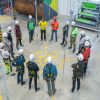Yatharth Gautam, Director & COO, Birla Open Minds Education Pvt. Ltd.
In a rapidly evolving world where change is the only constant, academic excellence alone is no longer enough to guarantee success. While traditional education systems have long prioritised subject matter expertise and technical skills, there is a growing recognition that soft skills—such as communication, collaboration, adaptability, and emotional intelligence—are equally essential for holistic development and long-term success.
The Growing Importance of Soft Skills
Today’s employers don’t just seek graduates with strong academic records; they’re looking for individuals who can lead teams, solve problems creatively, manage interpersonal dynamics, and adapt to change. According to a report by Bloomberg, while institutions are adept at developing hard skills, many graduates enter the workforce underprepared for the interpersonal and leadership demands of modern jobs.
Soft skills, also referred to as power skills or core competencies, are transferable across industries and roles. Whether in healthcare, business, technology, or the arts, professionals with well-developed communication and leadership skills consistently outperform those who may be technically proficient but lack social competence. These skills directly influence workplace success, personal growth, and the ability to build meaningful relationships.
Beyond the Workplace: Life Skills for Personal Growth
The benefits of soft skills extend far beyond the professional realm. Emotional intelligence and effective communication are critical for maintaining healthy relationships, managing stress, and navigating adversity. Skills such as empathy, conflict resolution, and self-awareness contribute to personal wellbeing, resilience, and a more compassionate outlook—traits that are vital in today’s interconnected world.
Integrating Soft Skills into K–12 Education
Recognising the growing importance of these skills, forward-thinking educational institutions are embedding soft skills training into K–12 curricula. The goal is to nurture these competencies early on so that students are better equipped to face an unpredictable and competitive future.
Incorporating activities like debates, public speaking, group projects, and collaborative learning not only strengthens students’ communication and teamwork abilities but also builds confidence and critical thinking. These experiences encourage students to express themselves clearly, work effectively in teams, and tackle challenges creatively.
Structured programmes focused on emotional intelligence and self-regulation have also shown promising results—reducing behavioural issues, fostering inclusivity, and improving overall classroom engagement.
Global Frameworks Supporting Soft Skills
Educational frameworks such as CASEL (Collaborative for Academic, Social, and Emotional Learning) have highlighted the significance of soft skills in K–12 education. CASEL outlines five core competencies crucial for both personal and academic success:
-
Self-awareness
-
Self-management
-
Social awareness
-
Relationship skills
-
Responsible decision-making
These competencies are not only essential for individual development but also for building inclusive, empathetic communities.
Preparing Future-Ready Learners
In today’s complex world, embedding soft skills into the fabric of education is not optional—it’s essential. Institutions that prioritise these competencies alongside academic rigour will not only nurture high-achieving students but also develop future-ready leaders who can think critically, act compassionately, and lead responsibly.
The true value of education lies not just in the acquisition of knowledge, but in the ability to apply it effectively in real-world scenarios. As educators, policymakers, and parents, it’s our collective responsibility to ensure that the next generation is equipped not just with facts and figures—but with the wisdom, empathy, and resilience to thrive in a dynamic world.
Also Read: Career opportunities for MBBS graduates

















Add comment